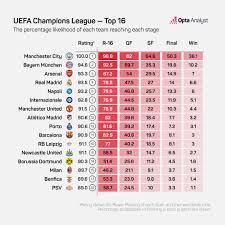Understanding Opta and Its Impact on Sports Analytics

Introduction to Opta
In the world of sports, data analytics has become a fundamental component in assessing player performance, team strategies, and overall game dynamics. Opta, a company renowned for its comprehensive sports data analysis, stands out as a leader in this field. Founded in 1996, Opta provides thousands of detailed statistics across various sports, making it a crucial resource for teams, broadcasters, and fans alike. In an era where data-driven decisions can significantly impact outcomes, understanding the importance of Opta and its offerings is more pertinent than ever.
The Role of Opta in Sports
Opta’s services encompass a wide array of sports, including football, rugby, cricket, and American football, among others. The company captures live match data, which is then transformed into detailed statistics that are analysed and distributed to media outlets, teams, and even betting companies. This wealth of information enables coaches to evaluate player performances, make tactical decisions, and understand opponent strategies in-depth.
For instance, in football, Opta tracks metrics such as possession percentages, shots on target, passing accuracy, and player movements. This level of detailed analytics helps clubs make informed decisions regarding player transfers, training regimes, and in-game tactics. Major leagues and clubs like the Premier League, UEFA, and many others rely on Opta data to gain a competitive edge.
Recent Developments and Innovations
In recent years, Opta has expanded its reach and offerings. The integration of machine learning and artificial intelligence into data analysis has allowed Opta to provide even more insightful reports and predictions. The company’s database not only focuses on current player statistics but also offers historical data, enabling analysts to observe trends over time and make projections about future performance. There’s also a growing trend towards visualising data, which makes complex statistics more accessible to fans and analysts alike.
Moreover, during the recent 2022 FIFA World Cup, Opta gained extensive coverage as it provided real-time data feeds for broadcasters, enhancing viewer experience and engagement through engaging visuals and statistics that were incorporated into world-wide broadcasts.
Conclusion: The Future of Sports Analytics
As sports continue to evolve, the relevance of data analytics will only increase. Opta is at the forefront of this transformation, continually innovating and adapting to the demands of teams and fans. With technology rapidly advancing, the horizon looks promising for Opta, as it aims to offer even deeper insights into sports performance. For fans, analysts, and teams alike, understanding and utilising Opta’s information can provide critical advantages and foster a deeper appreciation of the complexities involved in sports.






